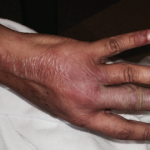New research raises questions about the cardiovascular safety of febuxostat for gout patients compared with allopurinol. The study found that although febuxostat was noninferior to allopurinol, febuxostat-treated patients had similar overall rates of major adverse cardiovascular events as allopurinol-treated patients, but had higher rates of all-cause mortality and cardiovascular mortality…









